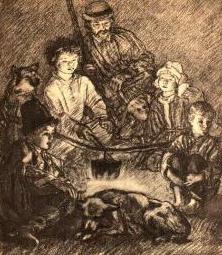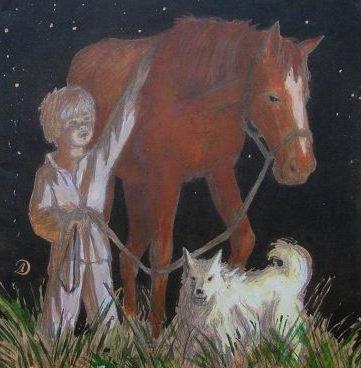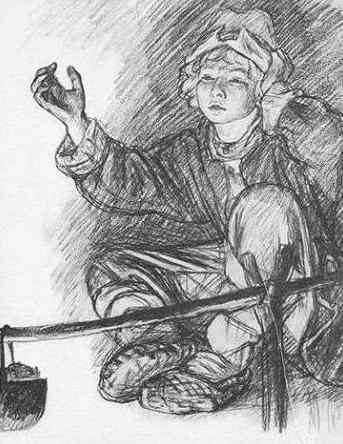I. S. Turgenev, a nobleman by birth, had an excellent lordly upbringing. Meanwhile, the cycle of stories "Notes of a Hunter" brought him fame, the main characters of which were ordinary peasants. Its publication in 1852 was the reason for Turgenev's expulsion to the family estate of Spasskoe-Lutovinovo. The reason is quite simple: the writer showed how interesting, sincere and talented many representatives of the lower strata were, which became an unusual phenomenon in Russian literature. The collection also includes the story "Bezhin Meadow".
The narrator, returning from hunting, got lost and wandered around the neighborhood for a long time. Already at dusk he went out to Bezhin Meadow and distinguished two lights not far off. There was no choice, and the narrator went - as he believed - to the herdsmen, who were fussing around the fire. However, before him were five peasant children who went out at night to guard the herd of horses. After talking a little with new acquaintances, the narrator lay down a little further away and pretended to fall asleep. He himself watched the children, who, in order to pass the time, began to tell "tales". The unhurried children's conversation was only once interrupted by the barking of dogs, and one of the boys, Pavlusha, rushed after them into the darkness. Soon he returned, deftly jumped off the horse and, when asked what was there, waved his hand: “I thought wolves ...” Only in the morning the children fell into a deep sleep, and the narrator went on.
Turgenev ends the work "Bezhin Meadow" with a message about the death of one of the boys: Pavlusha fell off his horse and crashed that same year.
Heroes of the story through the eyes of the author
There were five children, whose names the narrator learned in the course of the conversation. The author gives a detailed description of each of them, and also conveys the content of the conversation, trying to preserve the features of speech, the intonation of each of the characters.

Attention is immediately attracted by the eldest - Fedya, fourteen years old. He stood out from the others in appearance and behavior. Good clothes suggested that Fedya was from a wealthy family and accidentally ended up in Bezhin Meadow. The summary of all his remarks (he deftly controlled the conversation, but he himself did not take part in telling the stories) expresses a sense of superiority over others.
The second, Kostya, attracted attention with his gaze. His large, shining eyes seemed to hide some secret, and he himself looked like a rather interesting person.
Ilyusha did not stand out in any way, but it was he who turned out to be the most talented storyteller.
Seven-year-old Vanyusha (the narrator seemed to give him so much) he did not immediately notice. Because of his small age, the boy only listened to his older comrades. However, it is he who subtly feels nature: "... look at the stars of God - that the bees are swarming!"

Finally, the fifth - Pavlusha. From the story "Bezhin Meadow" he is remembered more than others. Only the narrator calls him by his full name - Pavel, and also reports at the end of the story about his tragic fate. Why is Pavlusha interesting to the author and the reader?
Outwardly, it was difficult to call him attractive, but everything about him was right. The eyes radiated intelligence, and an incredible power was seen in the whole appearance. If the rest of the boys listen to stories with fear, then Pavlusha gives a truthful explanation to everything - worldly experience tells. He rushes alone into the night after the dogs, and then waves his hand slightly, as if nothing had happened. Reasonable remarks, including comments on bylichki, and actions are his best characteristic.
"Bezhin meadow" - a journey into the world of fairy tales
Children's characters are revealed thanks to unusual stories that Kostya and Ilyusha tell in turn, the rest listen more and express their attitude to the events described.
Bylichki are works of folklore in which an installation is made for the veracity of what is happening. Just like fairy tales, beliefs, myths, etc., they express people's ideas about the structure of the world. If we talk about the bylichki that sound in the work “Bezhin Meadow”, their brief content can be reduced to stories about evil spirits and fairy-tale heroes (these are goblin, water, brownie, mermaid), about the dead and fortune-telling. All the guys, except Pavlusha, perceive them as real, therefore no one doubts their veracity. Ilyusha is especially interesting: his speech is emotional, full of repetitions and colloquial words, which makes the story convincing. There is a feeling that the boy really witnessed all his stories.
Coincidence or omen?

The story of Pavlusha fits in interestingly with what is happening. While he was walking to the river, Kostya tells about the drowned Vasya. His mother allegedly foresaw the death of her son and tried her best to protect him from water. Returning Pavlusha, to the surprise and fear of the guys, said: "I heard Vasya's voice." And then he told how someone from the river kept calling him: “Come here ...” To Ilyusha’s words that this was a bad omen, Pavlusha only replied that “you can’t escape your fate.” This is how I. Turgenev designates another theme of his narration. "Bezhin Meadow" is also a story about a man and his fate. It is no coincidence that in the finale it seems that the tragedy in Pavlusha's life was predicted on that dark night.
Image of nature
It is necessary to note one more feature of the story "Bezhin Meadow". The summary of the work will be incomplete without defining the role of nature in it. It occupies an important place and is shown in dynamics.
A rather voluminous landscape sketch at the beginning of the story is given in calm golden and silvery colors. In contrast to the first, the dawn of the second day is depicted, in which all colors (gold, scarlet, red, green) are bright and saturated. They symbolize joy (including from the advent of a new day that dispersed the darkness), courage (I remember Pavlusha's act), the life-affirming power that the narrator felt after meeting with the children.

A majestic picture is drawn with the onset of night, and here it is important that both the nobleman-narrator and the peasant children could see the surrounding beauty. The landscape helps to understand their state of mind and the ability to see and appreciate beauty. It also emphasizes the indispensable connection between man and nature, which for peasants is an integral part of life.
Meaning of the story
Peasants - talented, original, subtly feeling nature - are people who deserve respect. This is exactly what I. S. Turgenev draws attention to in the stories of the cycle “Notes of a Hunter”. "Bezhin Meadow" stands out from their number in that in it the writer's gaze is turned to the wonderful world of children, emotional, pure, sincere. But, unfortunately, the enthusiastic state of communication with the characters is replaced both for the narrator and for the readers by disturbing thoughts about their difficult future.







